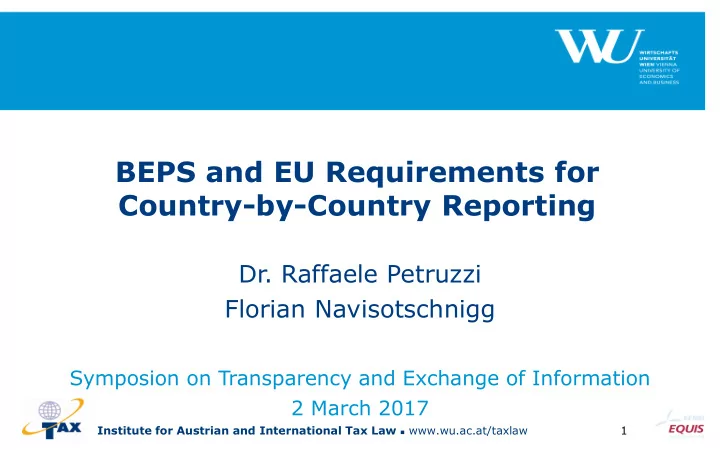

BEPS and EU Requirements for Country-by-Country Reporting Dr. Raffaele Petruzzi Florian Navisotschnigg Symposion on Transparency and Exchange of Information 2 March 2017 Institute for Austrian and International Tax Law www.wu.ac.at/taxlaw 1
Introduction October 2015 : OECD BEPS Action 13 Final Report on “Transfer Pricing Documentation and Country -by-Country Reporting ” increasing transparency about the global value chain of MNEs, in order to perform a first assessment as regards transfer pricing risks and BEPS April 2016 : EC proposal to make certain data of the CbCR available to the public May 2016 : EU adopts the OECD standards on CbCR as part of its Anti-Tax-Avoidance-Package Institute for Austrian and International Tax Law www.wu.ac.at/taxlaw 2
Content: Table 1 Overview of allocation of income, taxes and business activities by tax jurisdiction Institute for Austrian and International Tax Law www.wu.ac.at/taxlaw 3
Content: Table 2 List of all the Constituent Entities of the MNE group included in each aggregation per tax jurisdiction Institute for Austrian and International Tax Law www.wu.ac.at/taxlaw 4
Content: Table 3 Additional Information Institute for Austrian and International Tax Law www.wu.ac.at/taxlaw 5
Preparing the Report Key challenges ensure validity and comparability of the provided information avoid misinterpretation Questions over how to populate the CbCR Sources of data Application Questions Institute for Austrian and International Tax Law www.wu.ac.at/taxlaw 6
Sources of Data Free choice of sources of data Consistent use of the same sources Top-down vs bottom-up approach Institute for Austrian and International Tax Law www.wu.ac.at/taxlaw 7
Application Questions Vague definitions Number of inconsistencies Risk of data misinterpretation or even data misuse (formulary apportionment) Institute for Austrian and International Tax Law www.wu.ac.at/taxlaw 8
Information Exchange EU Administrative Cooperation Directive OECD: Multilateral Convention on Administrative Assistance in Tax Matters Bilateral Tax Conventions Tax Information Exchange Agreements Institute for Austrian and International Tax Law www.wu.ac.at/taxlaw 9
Information Exchange (cont’d) Confidentiality Appropriate use Assessing high-level transfer pricing risks Evaluating other BEPS related risks Economic and statistical analysis Institute for Austrian and International Tax Law www.wu.ac.at/taxlaw 10
Double Taxation Increase of double taxation expected Remedies of MNEs are insufficient EU Arbitration Convention BEPS Action 14 Institute for Austrian and International Tax Law www.wu.ac.at/taxlaw 11
Inclusive Framework Institute for Austrian and International Tax Law www.wu.ac.at/taxlaw 12 12 Source: OECD
Implementation BEPS 13 (Exchange of CbCR) Institute for Austrian and International Tax Law www.wu.ac.at/taxlaw 13 13 Source: OECD
Conclusions Pros: enhanced transparency Cons: compliance burden, application questions, usefulness of the data Tool to enable tax administrations to “ask the right questions”? Need to read it together with MF and LF Questions on sharing information and on data publicity OECD Review 2020 Lower threshold? Public information? Institute for Austrian and International Tax Law www.wu.ac.at/taxlaw 14
Conclusions Potential to “change behaviors”, However need for Resources (personnel and technical) Training Cooperative compliance tools (joint audits, rulings, APAs) Dispute resolution tools (MAP, arbitration, …) Institute for Austrian and International Tax Law www.wu.ac.at/taxlaw 15
Many thanks for your attention! Department of Public Law and Tax Law Institute for Austrian and International Tax Law Welthandelsplatz 1, Building D3, 1020 Vienna, Austria Dr. Raffaele Petruzzi, LL.M. Florian Navisotschnigg raffaele.petruzzi@wu.ac.at florian.navisotschnigg@wu.ac.at www.wu.ac.at/taxlaw, www.wu.ac.at/dibt Institute for Austrian and International Tax Law www.wu.ac.at/taxlaw 16
Recommend
More recommend